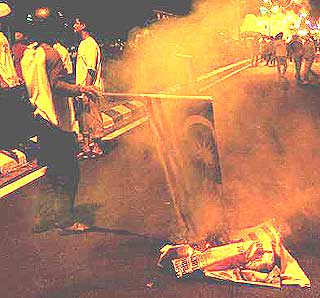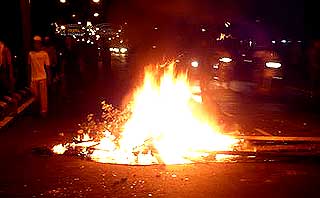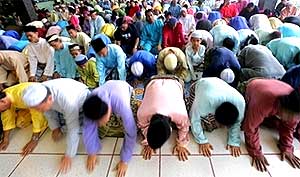"... O People, listen to me in earnest, worship Allah, say your five daily prayers (Salah), fast during the month of Ramadhan, and give your wealth in Zakat. Perform Hajj if you can afford to. You know that every Muslim is the brother of another Muslim. You are all equal. Nobody has superiority over the other, except by piety and good action ."
- from the last sermon of Prophet Muhammad (peace be upon him)
How do Muslims in this country greet the holy month of Ramadhan?
The incident in Batu Buruk is one preview of the pattern of violence that is going to grow bigger. Just like the preview of the coming general elections as we saw in Ijok.
Ramadhan is also welcomed by the report on mis-management of funds - of prices ridiculously bloated up, as in the findings of the absurdity of what America's Pentagon paid (screws, screw-drivers, etc.) in the mid-1980s at the height of the Iran Contragate scandal. We have not even been able to keep up to date with the story of the hideous murder of Altanthunya, or the controversies over issues versus non-issues, of flag burning, deconstructed Malaysian national anthem, and all that jazz that colour and characterise the coming of the postmodern age in Malaysia.
 Ramadhan is also welcomed by the news-story of the imminent invasion of Iran by the United States Empire that is losing its battle in Iraq after spending more than a billion dollars a month and after more than half a million Iraqi civilians have died and almost four million Iraqis displaced by both the invasion and sectarian violence. The illegal war has become one the American people cannot stop; worse than their Vietnam.
Ramadhan is also welcomed by the news-story of the imminent invasion of Iran by the United States Empire that is losing its battle in Iraq after spending more than a billion dollars a month and after more than half a million Iraqi civilians have died and almost four million Iraqis displaced by both the invasion and sectarian violence. The illegal war has become one the American people cannot stop; worse than their Vietnam.
Our Ramallah
But our Ramallah is here, a place wherein forces of radical change are fighting against a machine that is seemingly unstoppable one running on 50 years of hegemony, control, power, ideology, and construction of selective history passed as truth.
How do Muslims here and in this world "ramadhanise" itself entirely? How do the Malays, predominantly Muslims, spread the message of peace and non-violence in an age wherein violence and brute force via the use of modern anti-riot technology can easily be rationalised in the name of "national security"?
In Batu Buruk, why would a gathering of protesters - against massive corruption and growing arrogance and power abuse - be met with such chaos and unnecessary force? Are we seeing the beginning of more violence, or is this an early evolution of our own satyagraha (non-violent protest movement) that is going to be a norm of our own Civil Rights movement in Malaysian politics?
 We have greeted Ramadhan with so much violence of forms visible and structural. Visibly we have seen the destruction of Kampong Berembang, houses of worship, a human demolition using the C-4 explosive, ill-treatment of our foreign workers, rising crime rate, rampant corruption, conspicuous consumption, etc. Structurally, we have seen and felt violence since our 50 years of independence discriminatory policies that culminate in a more sophisticated form of racism, neglect of the plight of the poor of all races, the deterioration of the morale of our youth, the cultivation of a wayward and even rude generation as in the Mat Rempits, the systematic suppression of ethical-critical voices in our public universities under the pretext of "disciplining students and academics", the countless high profile corruption cases not attended to and the list goes on and on.
We have greeted Ramadhan with so much violence of forms visible and structural. Visibly we have seen the destruction of Kampong Berembang, houses of worship, a human demolition using the C-4 explosive, ill-treatment of our foreign workers, rising crime rate, rampant corruption, conspicuous consumption, etc. Structurally, we have seen and felt violence since our 50 years of independence discriminatory policies that culminate in a more sophisticated form of racism, neglect of the plight of the poor of all races, the deterioration of the morale of our youth, the cultivation of a wayward and even rude generation as in the Mat Rempits, the systematic suppression of ethical-critical voices in our public universities under the pretext of "disciplining students and academics", the countless high profile corruption cases not attended to and the list goes on and on.
Our Ramadhan
This Ramadhan, we must collectively meditate upon the issues plaguing us and find solutions based on what is being taught to us. If Ramadhan is to be an antidote to the "ramallahi-sation" of the Malaysian society, Malays and Muslims and those in power by virtue of being a hybrid of both, must do reflect upon these:
- That we must hold on fast to the conviction that the hungry and the dispossessed of this nation are not only Malays and Muslims but also men, women and children of all faiths and ethnicity. An economic policy that is blessed with the spirit of Ramadhan must meet the needs of all races. The New Economic Policy not only has run its course but is tribalistic in nature.
- That we must refrain ourselves from using our power and the trust given to us to rob the nation and to use our position to enrich our political parties and to continue to accumulate wealth to acquire power absolutely. A political system consisting of political parties that feed themselves with money derived from questionable means will be one tsunamied by the anger of the people.
 - That we must come out of the Ramadhan experience with the conviction that Islam and all religious belief systems that practice "fasting", self-control, and self-reflections will conspire with fate to design a better system of governance one that is based not on the race to meet the needs of our material greed but one that brings dignity to the poor. If, for Muslims, Ramadhan is not only to "feel what the poor and hungry" feel, then a responsive politics must be the outcome of it. If the message of the Prophet of Islam, Muhammad (Peace be upon him) is to have us evolve beyond caste, class, race, color, creed, national origin, then the post-Ramadhan experience must teach policy-makers to do just that in the way the political-economic system is designed.
- That we must come out of the Ramadhan experience with the conviction that Islam and all religious belief systems that practice "fasting", self-control, and self-reflections will conspire with fate to design a better system of governance one that is based not on the race to meet the needs of our material greed but one that brings dignity to the poor. If, for Muslims, Ramadhan is not only to "feel what the poor and hungry" feel, then a responsive politics must be the outcome of it. If the message of the Prophet of Islam, Muhammad (Peace be upon him) is to have us evolve beyond caste, class, race, color, creed, national origin, then the post-Ramadhan experience must teach policy-makers to do just that in the way the political-economic system is designed.
Before this nation becomes a Ramallah in which its leader is prisoner to his/her own struggle, we must ramadhanise ourselves and collectively struggle for peaceful changes, via peaceful means; via means that even the police and the civilians and power abusers and protesters can respect each others' need to change governments that no longer respect the coming of Ramadhan.
Let our Ramadhans stop us from becoming a Ramallah.

